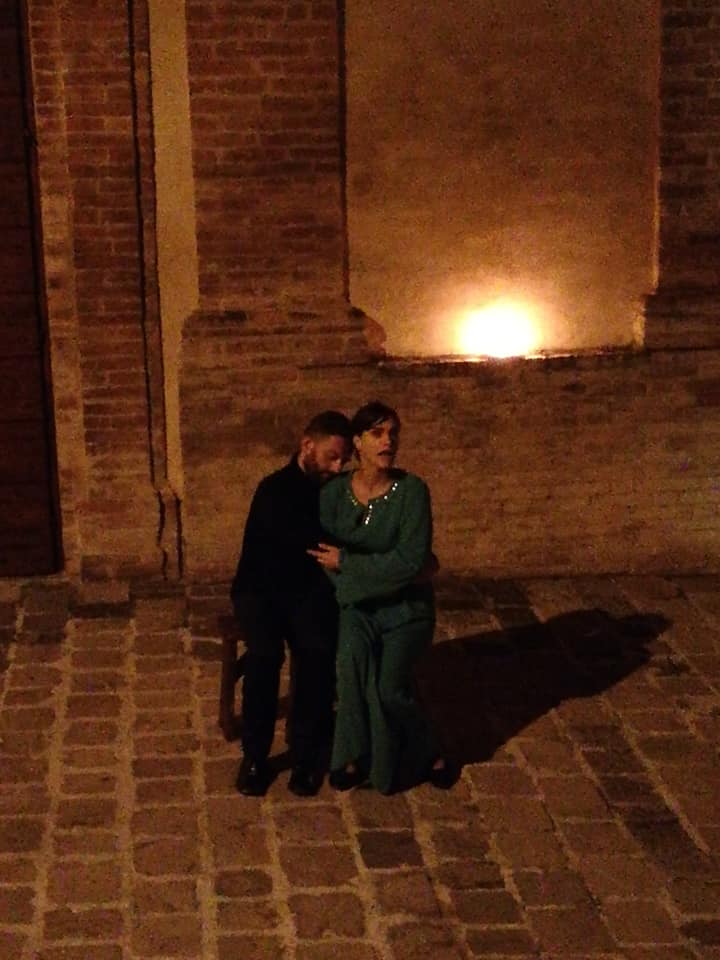A night of drama and magic in Montalto delle Marche.
At the very end of summer 2019, we were treated to a walking evening dramatisation of Dante’s Inferno, performed by an itinerant theatre group of actors, who, in the historic centre, presented this stunning journey of the human soul into the various depths of Hell. Many townspeople attended, the streets were lit with candles, the atmosphere was palpable and I was simply spellbound.

The Divine Comedy (Divina Commedia) is a long Italian narrative poem by Dante Alighieri, begun in 1308 and completed in 1320, a year before his death in 1321. It is widely considered to be the pre-eminent work in Italian literature and one of the greatest works of world literature. It comprises three major ‘cantiche’ – Hell, Purgatory and Paradise. All Italian schoolchildren study this stunning work.

While Inferno can be read as a straightforward story about Dante’s journey through Hell, it is also a long allegory for man’s descent into sin.

Limbo, lust, gluttony, greed, anger, heresy, violence, fraud, treachery.
Dante represents everyone. He loses the path of salvation in a shadowy world of sin. He travels the path through Hell trying to find his way back to God’s grace.
“My thoughts were full of other things when I wandered off the path. In the middle of the journey of our life I found myself within a dark woods where the straight way was lost.”
Those approaching Inferno for the first time, as I did, might benefit from a brief structural description. This is Dante’s journey through the nine circles of Hell, guided by the poet Virgil. At the beginning of the story, a woman, Beatrice, calls for an angel to bring Virgil to guide Dante in his journey so that no harm will befall him.

An unquestionably significant part of Dante’s aim in writing Inferno was to offer a large-scale commentary on the political nightmare of fourteenth-century Florence, from which he had recently been exiled. Being as he was embroiled in the Guelph–Ghibelline conflict, he condemns political figures with whom he disagreed by scattering them ruthlessly throughout Hell.
“As in the autumn-time the leaves fall off, first one and then another, till the branch surrenders all its spoils to the earth; in similar fashion did these evil seeds of Adam throw themselves from the group, one by one, into the boat at Charon’s signal, as a bird is called to its lure.”

“There is no greater sorrow than to recall our times of joy in wretchedness”.
Dante draws on classical Greek themes and imaginative comparison between a soul’s sin on Earth and the punishment he or she receives in Hell. “The Sullen choke on mud, the Wrathful attack one another, the Gluttonous are forced to eat excrement”, and so on. Wonderful!
“For she doth make my veins and pulses tremble.”

“Through me, you go into a city of weeping; through me, you go into eternal pain; through me you go amongst the lost people”

He comments on people who have never experienced success nor failure.
“Master, what is it that I hear? Who are those people so defeated by their pain?” And he says to me: “This miserable way is taken by the sorry souls of those who lived without disgrace and without praise.”
Allegorically, the Inferno represents the human soul seeing sin for what it really is, and the three beasts represent three types of sin: the self-indulgent, the violent, and the malicious.

“Through me you pass into the city of woe:
Through me you pass into eternal pain:
Through me among the people lost for aye.
Justice the founder of my fabric moved:
To rear me was the task of power divine,
Most supreme wisdom, and primeval love.
Before me things create were none, save things
Eternal, and eternal I shall endure.
All hope abandon, ye who enter here.”
“They now co-mingle with the coward angels,
the company of those who were not rebels
nor faithful to their God, but stood apart.
The heavens, that their beauty not be lessened,
have cast them out, nor will deep Hell receive them —
even the wicked cannot glory in them.”
“So bitter is it, death is little more;”

Understanding begins to evolve.
“Salvation must grow out of understanding, total understanding can follow only from total experience, and experience must be won by the laborious discipline of shaping one’s absolute attention.”

“As little flowers, which the chill of night has bent and huddled, when the white sun strikes, grow straight and open fully on their stems, so did I, too, with my exhausted force.”
It was a fantastic evening, I am smitten and intrigued by my new friend Dante, and I look forward to more delicious Divine Comedy outdoor theatre next summer in Montalto delle Marche.







